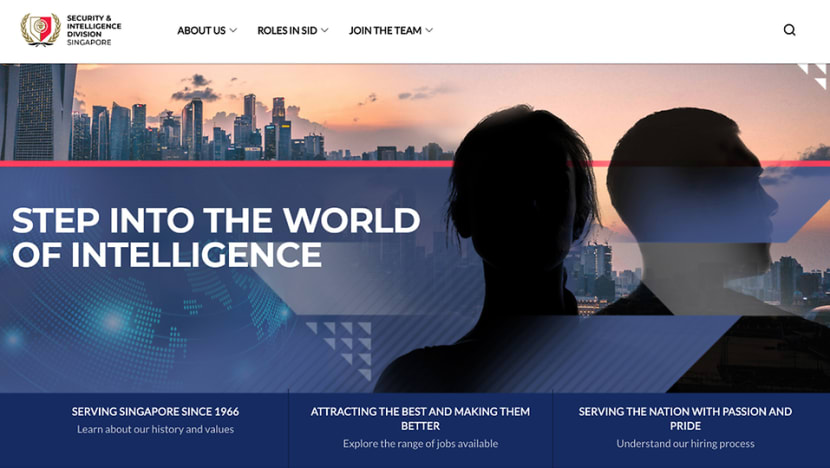Singapore intelligence officers open up as SID seeks to recruit more diverse talent

A screenshot of Singapore's Security and Intelligence Division's website launched on Jul 19, 2021.
SINGAPORE: In the starting scenes of an episode of The Blacklist, a female Chinese agent is assassinated. She's said to be an agent from Singapore's Security and Intelligence Division (SID), which is mentioned alongside other better-known acronyms - the KGB, CIA, MI6 - in the American crime thriller.
While Russia's state security apparatus KGB, the US' Central Intelligence Agency and the UK's Secret Intelligence Service (or Military Intelligence 6) feature frequently in popular media, Singapore's SID is rarely mentioned, even in the country.
What does SID do and how does reality match up to fiction?
There have been scattered anecdotes from previous officers who retired or left the service, but for the first time on Friday (Jul 16), active officers at the agency spoke to the media to give a glimpse into their operations.
Speaking in a virtual interview, the two officers' faces were not shown and they used pseudonyms as SID employees' identities are kept under wraps for security.
Michael, a senior director who has worked there for 20 years, told reporters that the Blacklist episode was "over-dramatised" and that SID would not call itself an "espionage agency".
"We are very discreet and ... we will get information as necessary, we have all kinds of sources. But I wouldn't call ourselves an espionage agency," he said.
"We picked up things on social media about SID and ... (what we do) is nowhere near what people say we do."
RECRUITING SINGAPOREANS FROM DIVERSE BACKGROUNDS
The misconceptions are not a surprise as SID only just launched a website on Monday - 55 years after the agency was set up in 1966.
Officially, SID is known to be Singapore’s external intelligence agency under the Ministry of Defence (MINDEF).
It provides intelligence and assessments to Singapore government agencies, supports deliberations on international and strategic issues and analyses global developments that could affect Singapore’s security and national interests.
In contrast to the Internal Security Agency (ISD), which deals with domestic threats, SID focuses on external threats in areas like geopolitics, foreign relations and transnational threats like terrorism and cybersecurity.
It is stepping out of the shadows now to recruit more Singaporeans from diverse backgrounds, even as much of its operations remain classified for national security reasons.
Michael shared that other intelligence agencies have recruited talent from websites and social media and been successful.
"With a public website, having a bigger outreach to Singaporeans, and at the same time using the website to explain our mission - what we do, to what we can do, in public - we hope that we'll be able to bring in more applications," he said.
The reason for this public outreach is that the agency's missions have expanded and it is seeking a "much broader spectrum of talents" from more diverse backgrounds.
EVOLVING THREATS
When it started in the 1960s, SID was focused on geopolitical developments in the region.
The division's remit has expanded to any event in the world that affects Singapore and for a time, it turned its focus to terrorism as that was a "direct threat" to Singapore, said Michael.
"As time moved on, the threats became a bit more complex in the sense that you didn't know where it was coming from," said Michael, who listed cyberthreats and information warfare as examples of evolving security threats.
SID is also looking at climate change and the changes it will bring, as well as future pandemics and other potential threats, he added.
"We learned actually from SARS (severe acute respiratory syndrome) ... It was a matter of time that some kind of pandemic would hit us. It’s just that we didn't know the form, and we didn't know when," he said.
"Things like climate change ... and what would be the effects of climate change down the line is something that would be threatening Singapore's national security because climate change could affect food supplies."
In the past, the agency largely recruited fresh graduates, but it has expanded its pool of mid-career entrants, and they include economists, lawyers and even a "banker" who helped them make sense of financial systems, he said.
BEING DISCREET ABOUT WHERE THEY WORK
Sophie, a senior analyst who has been with the agency for eight years, told reporters how she was recruited, which she said was "typical".
"I was invited for an SID tea session in my third year of my university studies. At the time I thought that the people who are speaking at the tea session were really very passionate about their work," said the history major who now works in the research department of SID.
"I personally was interested in international affairs and so I thought ... this might be something that's suitable for me."
Sophie, who speaks four languages (but could not tell reporters which four), said she has had many opportunities to train and learn in the service, including picking up additional languages and using technology for data analysis.
When people asked her where she works, she told them that she works at MINDEF, and that her work is "sensitive", she said.
But Sophie said that the need for discretion has not been a problem for her as her friends and family have been understanding about the sensitivity of her work.
“There are clear sacrifices that we have to make and we accept those," she said. "But then there are a good deal of pros ... a lot of people join us because they want to serve Singapore.
"It's also a very vibrant work environment ... And I think for people who are quite cerebral, quite intellectual, also quite adventurous, they will find a lot of fulfilment in the work.”
"VERY SENSITIVE"
When asked to go into more specifics about what they do, the answer was that "it is very sensitive". But Sophie said that she and her team have had to prepare intelligence assessments of political incidents that were developing quickly for policymakers to "make the best decisions for Singapore".
Michael, who was in operations for a decade before moving to corporate roles such as strategic planning, human resources and training, shared that he was involved in multi-agency operations to round up Jemaah Islamiyah terrorists who had fled Singapore in the early 2000s.
"The success of those operations was when we were able to actually either forewarn partners, or even forewarn the Singapore Government of the heightened terrorism threat that could have hit us,” he said.
Back then, a plot to bomb several embassies in Singapore, military bases and Yishun MRT station was thwarted by Singapore's security agencies.
The press release listed other significant operations such as helping to form the then-Joint Counter Terrorism Centre, which was subsumed under the National Security Research Centre, under the National Security Coordination Secretariat in 2004.
SID also supported efforts to disrupt a terror group’s plot to launch an attack on the Marina Bay Sands integrated resort in 2016, it said.
AVOIDING "GROUPTHINK"
But given the sensitivity of their work, would open recruitment lead to vulnerabilities?
Michael said that SID screens applicants stringently and will take the necessary "mitigating measures".
Job seekers may want to take note that the application process will take longer than other jobs, with a security clearance process that can take between three and six months.
And while the agency will have to take additional measures to screen a potential surge of applicants, Michael said that it is "something worth doing" to build up its capabilities.
"You need people with different perspectives. I think you need people to challenge the norms of what the current thinking is because if you don't, then you go into groupthink," he said.
"We do encourage within our organisation that sense of tension, that creative tension that ... will probably push us to do better assessments, but you can only get that if you bring in people who have very different perspectives from you."












